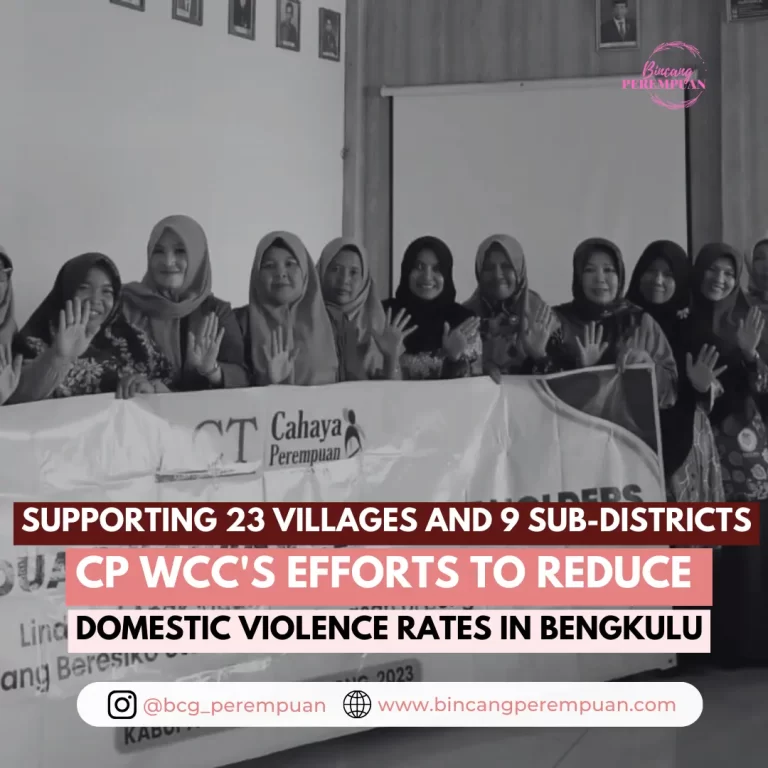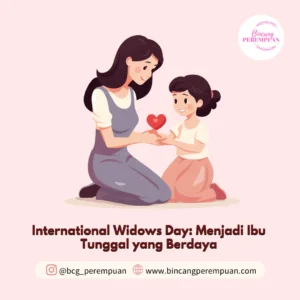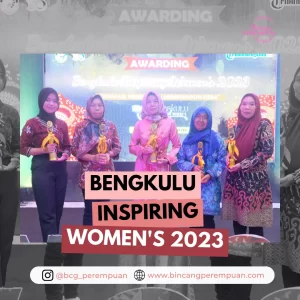- The CP WCC Local Staff’s presence is regularly met with opposition from religious and traditional leaders and even personal threats due to the belief that they encourage women to fight their partners.
- Nonetheless, the establishment consistently aids 23 villages and 9 sub-districts in Bengkulu Province to lessen occurrences of violence, specifically domestic violence (KDRT).
- The efforts are significant and effective in reducing instances of violence and implementing guidelines to thwart child marriage at the district level.
Bincangperempuan.com- Until November 2023, Simfoni KemenPPPA reported that there were 331 cases of gender-based violence in Bengkulu Province, with 282 incidents experienced by women. Sexual violence constitutes the highest number of cases with 173 incidents, followed by physical violence with 110 cases, and psychological violence with 72 cases.
Ironically, the home, which is supposed to be the safest place, has become the most common location for domestic violence. According to reports, there were 202 cases of domestic violence in Bengkulu Province. Specifically, 39 cases were committed by parents, 36 cases were committed by spouses, 26 cases were committed by other family members, and 37 additional cases were committed by neighbours. It is disheartening that the data demonstrates close family members are the primary perpetrators of domestic violence. The data highlights that the majority of victims of domestic violence come from within the household, with 216 victims having been reported.
Domestic violence is a chronic issue persisting in Bengkulu Province. According to Ermawati, the Head of PPA Agency in Bengkulu City, the majority of sexual violence cases reported in 2022 were linked to domestic violence, incest, and sexual abuse. This report demonstrates that urgent action is required to address the concerning incidence of domestic violence in Bengkulu Province.
Baca juga: Dampingi 23 Desa dan 9 Kecamatan, Upaya CP WCC Turunkan Angka KDRT di Bengkulu
Efforts to Prevent Gender-Based Violence from the Grassroots
Recognizing the pressing need to prevent domestic violence, Cahaya Perempuan WCC implemented a community mentoring program, Desa Dampingan Cahaya Perempuan WCC, in collaboration with religious and traditional leaders in the village. Since 2011, the organization has provided support to 23 villages and 9 sub-districts situated across Bengkulu City, Rejang Lebong Regency, Seluma Regency, and Kepahiang Regency.
At the village and sub-district level, community groups are formed by Cahaya Perempuan WCC for targeted assistance. The groups comprise a range of beneficiaries, including adult women, mothers, young men, and fathers, as well as children 12 years old who are entering the phase of menstruation and getting introduced to sex education. The objectives of these groups differ and are aimed at providing assistance to each group according to their specific needs.
“We engage men in discussing violence against women, as relying solely on women’s knowledge may be perceived as resistant or disobedient, particularly if they are married. However, if husbands are provided with awareness, it indicates that rights are being granted conscientiously,” stated Leksi.
Several activities are implemented to enhance comprehension and capacity, including the development of community-driven services for women who are victims of violence, community organization, policy and budgetary advocacy within the community, the provision of services for women impacted by violence, and regular monthly discussions.
“We begin with discussions, aiming to reinforce our capacity to address various forms of violence, including matters related to women’s rights,” she clarified.
At the district level, Cahaya Perempuan regularly conducts meetings every three months. These discussions involve religious leaders and policymakers, including the Women’s Empowerment and Child Protection Agency, the police, and other related agencies. The meetings are held to promote collaboration and address pertinent issues affecting the community.
Leksi stated that the program aims to address the underlying issues frequently experienced by middle- to lower-class families. She noted that the government’s attempts to eliminate gender-based violence have been restricted to socialization efforts through the involvement of community representatives, including village heads, department heads, and other officials who are well-versed in gender matters. However, there is a need for more extensive socialization among local residents.
The society stated that typically, active individuals in the village, such as the Head of Neighbourhood or Head of Hamlet, are invited. Although it raises the concerns of those who are not invited, The individuals who were not invited anticipate hosting the event at their location.
The society stated that typically, active individuals in the village, such as the Head of Neighbourhood or Head of Hamlet, are invited. The head of Hamlet personally requested this change. He believed that experts should directly deliver information about the protection of children and women and regulations to establish trust within the community.
“It’s advisable that the community receive education directly from experts, not from me, so they can hear for themselves about the law and its effects.” “Occasionally, we are not viewed as authorities if instructed by a local community leader. However, if a qualified institution discusses the matter, it holds more persuasive weight. Leksi replicated a statement from a Hamlet village leader supported by Cahaya Perempuan WCC, emphasizing the importance of consistent assistance.”
Therefore, Leksi hopes for intensive, periodic, and long-term community-oriented assistance aimed at encouraging behavioral change to reduce gender-based violence in Bengkulu, rather than solely relying on one-time information provision.
Baca juga: Susi Pudjiastuti: Ketamakan dan Keserakahan Manusia Terhadap Kerusakan Lingkungan
It is not easy, Cahaya Perempuan has been rejected, opposed and threatened
The presence of Cahaya Perempuan was not assumed, as the village holds a considerable negative stigma towards non-governmental organizations (NGOs). Consequently, the approach is executed with great care.
“When entering the village, we make a point of meeting with the village head, informing them of our organization’s purpose as a women’s group. During the initial meeting, the village secretary expressed concerns that NGOs were only interested in obtaining funds from their village, resulting in the closure of doors to such organizations. However, one resident noted that Cahaya Perempuan did not fit this description.
Following recommendations from the Health Office, Cahaya Perempuan visited the village due to the high levels of problems suffered by the area. Therefore, Cahaya Perempuan WCC aims to facilitate the problem-solving process rather than exacerbate it.
The organization makes it clear that they do not request any monetary contributions from the community. The village’s information was obtained from the recommendation office, and hence they consider it their responsibility to solve the problem.
Cahaya Perempuan WCC has encountered opposition from traditional and religious leaders while imparting information. This occurred when there was a misinterpretation within the community regarding Surah An-Nisa verse 34, which states that “Men are the maintainers of women, because Allah has made some of them to excel others, and because they spend out of their wealth.
The good women are obedient, guarding what Allah would have them guard.” If any misbehavior is detected in a wife, first advise her, and if the behavior persists, refrain from sharing the bed with her. If the misbehavior still persists, address the issue gently, but if the woman corrects her ways, do not treat her unjustly. Allah is the most powerful and great.
This Quranic verse is commonly misinterpreted to be an excuse for spousal violence.
Leksi revealed, “At first, we faced opposition from cultural and religious leaders who deemed it acceptable for Muslims, even though parts of the verse were abrogated.”
Therefore, Cahaya Perempuan conducts regular studies on verses that are often falsely interpreted as justifying violence against women. These studies involve Professor Budi Kisworo as a resource person and facilitator, aiming to demonstrate that past actions were incorrect.
An example of this issue can be seen in the area, where individuals caught committing adultery are paraded while lacking clothing, which presents a dilemma. “It was once deemed acceptable to provide a deterrent effect, but humanitarian principles require us to consider other factors,” she stated.
To establish a rapport with the community, Cahaya Perempuan dispatches one of their local staff to reside in the village throughout the mentoring period and engage in community activities. However, on occasion, the local staff, serving as Cahaya Perempuan’s representatives, face hostility from society.”
“Even the local staff received threats with messages such as ‘Don’t invite my wife to your activities anymore,’ as recounted by Leksi. This situation led to fear amongst the staff, who actually live in the area.
However, these challenges have not weakened Cahaya Perempuan’s determination. Any complaints about threats or obstacles faced by local staff are met with immediate support and assistance in communicating with the community.
Effective communication and negotiation with the community are our priorities.” Leksi explained that this success stems from raising awareness of women’s rights.
Over the past 12 years, the “Desa Dampingan Cahaya Perempuan” programme has effectively lowered child marriage rates and created regent regulations. The programme has had a significant impact on villages in Bengkulu Province, with the most noteworthy changes observed in Seluma Regency. The programme has had a significant impact on villages in Bengkulu Province, with the most noteworthy changes observed in Seluma Regency. The programme has had a significant impact on villages in Bengkulu Province, with the most noteworthy changes observed in Seluma Regency. Since 2016, there has been a significant reduction in child marriage rates in Talang Tinggi Village. Similarly, measures have been taken in Sidoluhur Village to prevent child marriage through the implementation of regulations. At the district level, extensive discussions involving multiple stakeholders have led to the introduction of Regent Regulation No. 27/2018, which pertains to the prevention of child marriage in Seluma.
“For the past few years, the village head has explicitly prohibited child marriage. After completing high school, children either pursue further studies in the city or find employment,” clarified Leksi.
The village head of Sidoluhur has implemented local regulations pertaining to marriage. Initially facing opposition from family members, the village head persisted in explaining that marriage for individuals under 21 years of age is not permitted. Subsequently, the community followed suit.
Before Cahaya Perempuan WCC provided information relating to child marriage and how it impacts stunted growth in children, the child marriage rate in Talang Prapat Village, as reported by Mrs. Tri Sapta, the Chairperson of the Women Group (PKK), was alarmingly high, with six children marrying within six months. However, following the entrance of Cahaya Perempuan into the village in 2021, the Chairperson of the PKK and other cadres have taken proactive steps to provide information and mentoring to individuals who may have planned to marry before the age of 19. Additionally, PKK produces and distributes supplementary food for stunted babies and toddlers.
“Since joining Cahaya Perempuan, the Chairperson states that there will be no further instances of child marriage until early 2023 and that the stunting rate has been reduced to zero.”
Leksi aspires for sustained continuation and full backing from the government for this programme, predominantly concerning the funding aspect, which presently relies on donors.
“However, Cahaya Perempuan is restricted as it cannot initiate any action in the absence of funding, which the government has yet to stipulate and allocate in its budget,” she elaborated.
Since 2015, Cahaya Perempuan’s programs have been supported by multiple donors, including WPF, the Canada Fund, AusAID, the Bengkulu Provincial Government Grant, APBN via the Ministry of Law and Human Rights Legal Aid Organization programme, Cowater, the Asian Community Trust, and FAMM Indonesia. (**)




